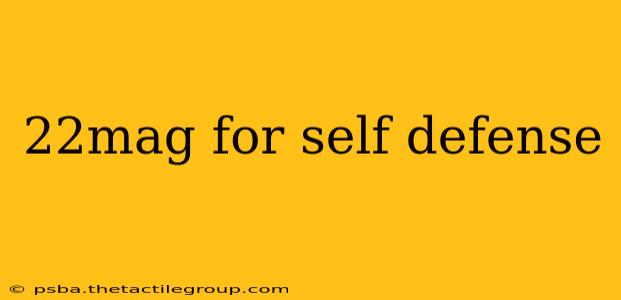The .22 Magnum, often shortened to just ".22 Mag," is a potent cartridge frequently considered for self-defense. However, its suitability for this critical role is a complex issue demanding careful consideration. This article will delve into the strengths and weaknesses of the .22 Magnum for self-defense, providing a balanced perspective to help you make an informed decision.
The Case for the .22 Magnum in Self-Defense
Proponents of the .22 Magnum for self-defense highlight several key advantages:
-
High Velocity and Penetration: Compared to the ubiquitous .22 Long Rifle, the .22 Magnum boasts significantly higher velocity and greater penetration power. This translates to a better chance of incapacitating a threat, even through light barriers like clothing.
-
Compact and Lightweight: The .22 Magnum is available in various compact revolvers and semi-automatic pistols, making it ideal for concealed carry. Its lighter weight compared to larger calibers contributes to ease of handling and reduced fatigue during extended carry.
-
Reduced Recoil: The relatively low recoil makes the .22 Magnum easier to control and shoot accurately, especially for individuals with smaller builds or limited shooting experience. This is crucial in a high-stress self-defense situation.
-
Ammunition Availability: While perhaps not as ubiquitous as 9mm or .45 ACP, .22 Magnum ammunition is readily available at most gun stores and online retailers.
The Arguments Against .22 Magnum for Self-Defense
Despite its advantages, the .22 Magnum faces significant challenges as a primary self-defense cartridge:
-
Stopping Power: This is the most significant drawback. While penetration is improved over the .22 LR, the .22 Magnum's relatively small bullet diameter and lower mass limit its stopping power. A single shot may not be sufficient to neutralize a determined attacker. Multiple accurate shots are crucial.
-
Overpenetration Concerns: While the .22 Magnum penetrates better than .22 LR, its potential for overpenetration in populated areas is a significant concern. A missed shot could easily endanger innocent bystanders.
-
Limited Cartridge Capacity: Many .22 Magnum firearms, especially revolvers, have limited magazine capacities. This restricts the number of shots available in a self-defense situation, increasing the pressure to make every shot count.
Choosing the Right Caliber: A Personal Decision
Ultimately, the suitability of the .22 Magnum for self-defense is a personal decision dependent on several factors:
-
Training and Proficiency: Effective self-defense requires extensive training and proficiency with your chosen firearm. Even the most powerful caliber will be ineffective in the hands of an untrained shooter.
-
Physical Capabilities: Individuals with smaller builds or limited upper body strength might find the reduced recoil of the .22 Magnum easier to manage.
-
Legal Considerations: Always check local and state laws regarding firearm ownership and concealed carry before making a purchase.
-
Alternative Options: Many other calibers, such as 9mm, .380 ACP, and .45 ACP, offer superior stopping power and are often preferred for self-defense.
Conclusion: A Balanced Perspective
The .22 Magnum can be a viable option for some individuals in specific situations. However, it's crucial to acknowledge its limitations regarding stopping power and overpenetration. Thorough training, realistic self-defense scenarios, and a comprehensive understanding of the cartridge's capabilities are paramount. Consider this information carefully and consult with experienced firearms instructors and experts before making a decision about self-defense weaponry. Remember that personal safety is a matter of paramount importance, and choosing the right tool is only part of the equation. Proper training and awareness are equally critical.

